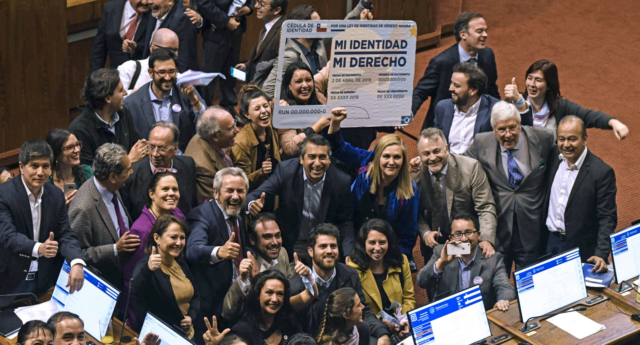On September 12th, Chile's Congress passed a law that allows transgender people 14 years and up to legally change their name and gender. The vote was 95-46 in favor, and was first introduced in 2013, but was able to pass only after it set the minimum age requirement of 14, with 14-18 year olds requiring parental permission. The President Sebastian Pinera has 30 days to decide whether to reject or accept it. This is a huge step towards equality for the members of the LGBTQ+ community in Chile, and is being widely celebrated by LGBTQ+ activists. I chose this topic because the LGBTQ+ community is still being discriminated against all over the world, not only the US, and as a queer person I believe it is important to stay up to date on LGBTQ+ victories worldwide. The US is a more accepting place than many other parts of the world despite being nowhere near perfect, but we have to remember that it is not like this everywhere.
 |
| Members of the left-wing party celebrate the passing of the law after voting successfully to pass it, as one of them holds up a fake identity card that says "My identity, my right." Photo: Francesco Degasperi/AFP/Getty |
This picture depicts the joyful reactions of people who are either allies or members of the LGBTQ+ community as they celebrate a huge step towards equality. Our eyes are quickly drawn to the woman holding up the fake identity card around her face with the words "My identity, my choice," which is a very powerful image, as it expresses how people should have the right to choose their gender and name in order to reflect who they are. This represents how transgender people in Chile feel about their identity, and the fact that they believe it is a basic human right to be able to decide their legal name and gender for themselves.
 |
| A transgender youth shows trans pride by dying their hair and painting the trans flag on their cheek. Photo: Movihle Chile/Flickr |
This photo is a portrait shot which shows one of the transgender youths that will be positively impacted by this new law. This gives a face to the LGBTQ+ people of Chile, reminding us that they are real people who deserve basic human rights and freedoms.
 |
| LGBTQ+ flags waving in Puerto Montt. Photo: Fernando Lavoz/NurPhoto/Getty Images |
This is a detail shot of an LGBTQ+ flag waving in a street of Puerto Montt, Chile during a celebration. This image shows flags that people are holding, as they also hold a sign during a pride parade. This shows that LGBTQ+ rights are important to many people in Chile, and that the passing of the new transgender law will positively impact many people's lives.
 |
| Deputies Chamber of Congress where the vote happened. Photo: Morocco World News |
This is a scene setter displaying the National Congress in Valparaiso, Chile. The vote on the law was 95-46, and this image makes the number of people who voted seem more real. Chile is a more conservative country, so the fact that that many people voted for this more progressive law giving more rights to members of the LGBTQ+ community is a very big deal.
 |
| A beautiful image of Valparaiso, Chile, where the vote took place. Photo: Chile Travel |
This image sets the scene for where the National Congress is located, which is where the vote for the law took place.
I chose these images because they demonstrate the important effect that this will have on people everywhere in Chile. When we read or hear about news, we are so distant and unaffected by it that we often forget that these are things actively and sometimes dramatically changing real human beings lives. My pictures tell a story, showing the beauty of Chile and the people there, but also emphasizing the important effect that this new law will have on a large number of people by showing people celebrating their victory and being prideful in their identities. Visual reporting can completely change the lens with which a story is told. If I had not chosen images of people whose lives were impacted by this law, the readers may not realize the importance that it has on the LGBTQ+ people of Chile. In the future, I believe that visual reporting will be done through videos and virtual reality, and we will no longer use still images to show what we are reporting on. Visual reporting will remain important and impactful in the media, but the way it is done will change drastically.





No comments:
Post a Comment